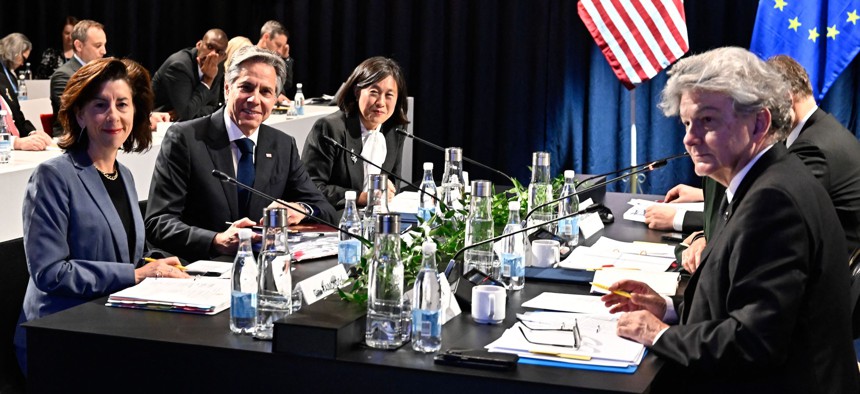Emerging tech, misinformation dominate May transatlantic council talks

U.S. Secretary of Commerce Gina Raimondo, U.S. Secretary of State Antony Blinken, U.S. Trade Representative Katherine Tai and European officials at a meeting of the Trade and Technology Council in Lulea, Sweden. JONAS EKSTROMER/TT NEWS AGENCY/AFP via Getty Images
The Transatlantic Technology and Trade Council spent last week laying groundwork for unified action on new technologies worldwide.
Emerging technologies dominated the fourth ministerial conference of the US-EU Trade and Technology Council, which emphasized the need for coordination in developing and leveraging critical technologies without overarching regulations.
Four areas of focus for the council are artificial intelligence, 6G, quantum information technologies and online platforms. Similar to domestic dialogues within the U.S., the TTC is looking to thread the needle between continued innovation, smart scaling and responsible usage.
“The United States and the European Union are committed to joint leadership in promoting and upholding an international rules-based order grounded in shared values,” a May 31 White House memo reads. “We are committed to make the most of the potential of emerging technologies, while at the same time limiting the challenges they pose to universal human rights and shared democratic values.”
The rise of new, generative AI systems constituted a disproportionate amount of conversation at the council’s meeting in Lulea, Sweden, with TTC member and U.S. Secretary of Commerce GIna Raimondo discussing the council’s goals amid the rapid development of AI technologies like ChatGPT.
“We are committed to making sure that the TTC provides a forum for stakeholder engagement: engagement of the private sector, engagement of our companies to figure out what can we do in the here and now to mitigate the risks of AI, but also, not to stifle the innovation,” she said during a panel discussion last week. “And that is a real challenge.”
In response to the growing prevalence of AI, the council will continue utilizing the TTC Joint Roadmap on Evaluation and Measurement Tools for Trustworthy AI and Risk Management, released in December 2022, and will also add three new focus groups for AI and generative AI systems: AI terminology and taxonomy; cooperation on AI standards and tools for trustworthy AI and risk management; and monitoring and measuring existing and emerging AI risks.
Participants also discussed advancing quantum technology research and development, specifically within the post-quantum cryptography field, along with sustainable technology research and securing a robust critical minerals supply chain.
The TTC also described new tactics to disrupt what it refers to as foreign information manipulation and interference in developing nations. The White House cited misinformation campaigns led by adversarial nations — namely China and Russia — targeted at nations in Latin America and Africa. Increased stakeholder engagement with countries in these regions was established as a key objective.
This will likely manifest in the TTC’s work with helping establish stronger digital infrastructures in countries they have identified as having burgeoning markets, such as Costa Rica, the Philippines, Jamaica and Kenya.






